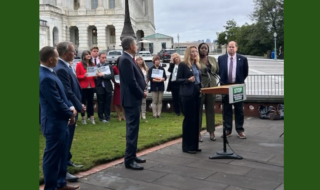October 13, 2025
Deadline for governor to sign or veto bills passes
Welcome to the October 13-17 edition of the Main Street Minute from your small-business-advocacy team in Sacramento.
Over and Done
The October 12 deadline for Gov. Gavin Newsom to sign or veto bills sent to him by the Legislature has come and gone. That’s it for the year. On to 2026.
NFIB is happy to report that a handful of pro-small-business bills that NFIB and its coalition partners lobbied for were signed into law, dealing with CEQA and other streamlining reforms (AB 609, AB 671, SB 607) and water (SB 72).
NFIB is not happy to report that many more bad-for-small-business bills were also signed. How could it be otherwise with a Legislature under one-party control and within that one party, under the control by its progressive faction, and with a chief executive eyeing the presidency.
Two of the more troubling measures signed into law strengthened the hand of Big Labor (AB 288, AB 1340) and tilted the board in favor employees on issues such as dispute resolutions (SB 82, SB 642).
NFIB will provide a fuller analysis of the year in a web story to come, 2025 End of Session Report on the California Legislature.
Ahead to 2026
Regular readers of the Main Street Minute know well what will be one of NFIB’s top legislative agenda items for 2026: getting the state to pay down or off the UI loans it took from the federal government. Embarrassingly, we are the only state in the union that took loans from Uncle Sam to keep our unemployment insurance trust fund solvent – and unemployment benefits going to those in need of them – that has not paid back what it owes.
Another agenda item surfaced last week from a proven friend of small business, Sen. Roger Niello, who is offering the simple idea of taking the reforms stakeholders came up with to finally get a handle on PAGA (Private Attorneys General Act) abuse and applying them to the legal abuse occurring much too frequently with the Americans with Disabilities Act (ADA).
“The progress we saw with PAGA reform should set as a precedent for fixing another area of abuse: the Americans with Disabilities Act (ADA),” Niello wrote in a guest editorial for The Orange County Register, California showed progress with PAGA — now let’s do the same for ADA.
“Under the state’s Unruh Civil Rights Act, hyper-technical violations, such as a mirror hung slightly too high or a handicapped parking space angled a degree off standard, are subject to $4,000 in statutory penalties in addition to the overwhelming attorney fees that the everyday California business owners do not have the resources to afford. Thanks to these lawsuits, instead of making meaningful accessibility improvements that would help the disabled, business owners are hemorrhaging resources that could otherwise be used to expand their businesses or support their employees.”
What Others are Reporting
San Francisco Chronicle—New SALT cap means savings for California homeowners. Here’s how much
“A quick primer: Until 2017, taxpayers could deduct what they paid in state and local taxes from their federal taxable income. The average SALT deduction that year was $13,000 nationwide, according to the nonpartisan Tax Policy Center — but over $30,000 in four Bay Area counties (San Francisco, Santa Clara, San Mateo and Marin) with high incomes, home values and attendant property taxes.
“President Donald Trump’s 2017 Tax Cuts and Jobs Act capped the SALT deduction at only $10,000. Politicians from coastal blue states with high property taxes — both Democrats and Republicans — spent the next eight years trying to change that. The 2025 GOP tax bill didn’t undo the SALT cap, but created a new income-based limit of up to $40,000.”
The Orange County Register—Jon Coupal: Is California really a ‘donor state’?
“According to a Sept. 18 article by Nicole Nixon in the Sacramento Bee, California was actually a ‘recipient’ state in 2023, the most recent year for which data is available: ‘In its latest analysis of the cashflow between states and the federal government, the Rockefeller Institute of Government found California received $13.4 billion more in federal funds than what residents and businesses paid in tax receipts in 2023.’”
Calendar
November 4: Statewide Special Election Day on Proposition 50. Click here for more information from the secretary of state.
January 5, 2026: Legislature reconvenes
National
Highlights from Federal Government Relations Principal Louis Bertolotti’s weekly report
— The federal government has shut down for an undetermined period of time, as Congress continues to negotiate a funding agreement. NFIB has no position on this issue.
— NFIB sent a letter to the U.S. Senate HELP Committee. Principal of Federal Government Relations Dylan Rosnick said, “Congress continue[s] to ignore the challenges faced by small businesses, specifically the role that burdensome regulations play in increasing the cost of employment. The overwhelming majority of small businesses do not have HR departments or lawyers to assist with burdensome and time-consuming regulatory issues.”
— The Small Business Legal Center last week celebrated 25 years of fighting for small business. Founded in 2000 under the helm of its then-Executive Director Tom Sullivan, the Center has led on a number of noteworthy cases in the courts, from NFIB v. Sebelius (2011) to NFIB v. OHSA (2022). You can read more about their many victories over the years here, and can view their full case index here.
— NFIB filed an amicus brief in the case Ohio Telecom Association, et al. v. Federal Communications Commission, et al. at the U.S. Court of Appeals for the Sixth Circuit concerning whether federal agencies can reissue regulations that Congress previously overturned under the Congressional Review Act (CRA).
— NFIB filed another amicus brief in the case National Labor Relations Board v. N.Y. State Public Employment Relations Board, et al. at the U.S. District Court for the Northern District of New York regarding state labor laws and the NLRA.
Next Main Street Minute: October 20. All Main Streets Minutes can be found on the NFIB website here. Pull down the California tab in the upper-right-hand corner.
NFIB is a member-driven organization advocating on behalf of small and independent businesses nationwide.
Related Articles














